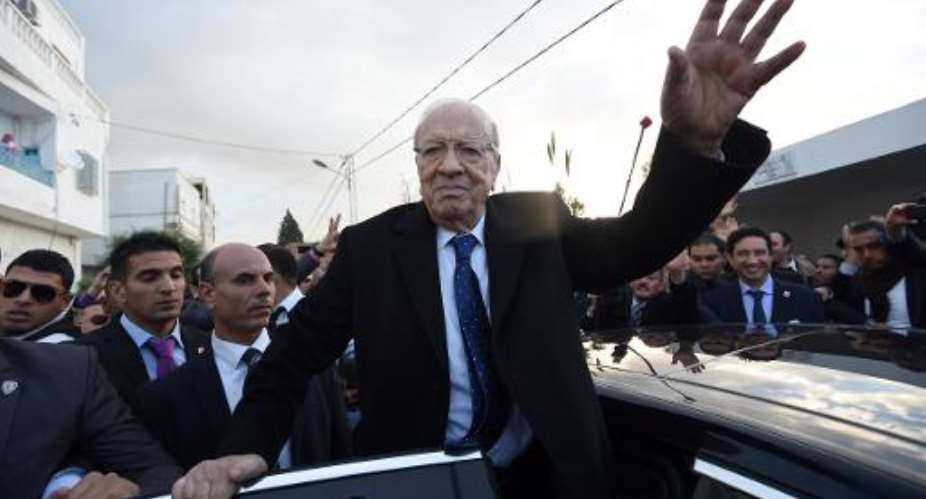Tunis (AFP) - Veteran politician Caid Beiji Essebsi, officially confirmed as Tunisia's new president Monday, had been the favourite to become the new head of state of the country that launched the Arab Spring.
Essebsi -- now 88 -- held key posts under Habib Bourguiba, the father of Tunisian independence, but also under dictator Zine El Abidine Ben Ali who was deposed in 2011.
An anti-Islamist lawyer, Essebsi became prime minister after the revolt and organised parliamentary elections later that year.
Born on November 29, 1926, he denied before the presidential election -- the first time Tunisians had been able to freely choose their own head of state -- that his age was a hurdle to assuming the nation's highest office.
"I have the age that I have," he told AFP, describing youth as "a state of mind".
His detractors had accused him of seeking to restore the regime of Ben Ali, who clung to power for 23 years before fleeing, combining authoritarian rule with a degree of prosperity and stability for his people.
But Essebsi stood his ground, saying that former Ben Ali regime figures had the "right" to play a role in governing Tunisia alongside all political factions.
"We want a 21st century state, a progressive state," Essebsi said in a reference to Islamists.
"What separates us from those people is 14 centuries," he said, alluding to the birth of Islam in the 7th century.
- Adviser to first president -
Born in Sidi Bou Said, a northern suburb of Tunis, the founder and chairman of the Nidaa Tounes (Call of Tunisia) party studied law in Paris and began practising in 1952.
After independence from France in 1956, he became an adviser to Bourguiba, holding a number of key jobs under him and later under Ben Ali.
Over the years, Essebsi was director general of the national police and interior minister. He later held the defence portfolio before becoming ambassador to France.
After a subsequent posting as Tunisia's envoy to Germany, he was named foreign minister.
He also served in parliament, holding the speakership in 1990 and 1991.
When Ben Ali skipped the country for exile in Saudi Arabia on January 14, 2011, prime minister Mohamed Ghannouchi declared himself president. But just a day later, parliament speaker Fouad Mebazaa took the reins of power.
Ghannouchi remained premier for another six weeks, before Mebazaa called on Essebsi to replace him and head an interim government until elections for a constituent assembly could be held.
Those polls, in December 2011, were won by the Islamist party Ennahda, and new interim president Moncef Marzouki appointed Ennahda's Hamadi Jabali to replace Essebsi.
- Landmark for Tunisia -
In October this year, Nidaa Tounes emerged as the winner in parliamentary elections, with Ennahda coming in a close second.
Marzouki was Essebsi only real rival in the first round of presidential voting last month, when neither took the majority required to win outright.
On Monday the electoral commission announced after the previous day's runoff that Essebsi had secured 55.68 percent of votes cast in a vote seen as a landmark for the march of democracy in Tunisia.
Essebsi has acknowledged that Ennahda is "part of Tunisia's political life", and his Nidaa Tounes does not rule out collaborating with it.
He is a shrewd politician whose communications style is to mix Koranic verses with old Tunisian proverbs.
It is also difficult to corner him.
During the campaign he was taken to task for the way he responded to criticism by a female Islamist member of the constituent assembly.
"She's just a woman," he said, explaining later that he said that out of gallantry, not wanting to criticise a woman.
"No one can doubt the fact that I consider Tunisia's women to be the guarantors of the democratic process. And I am one of those who participated in the liberation of women by Bourguiba," who introduced the Arab world's most liberal legislation on women's rights.
Essebsi is married and has two sons and two daughters.





 Togo leader Gnassingbe follows father's political playbook
Togo leader Gnassingbe follows father's political playbook
 NDC panics over Bawumia’s visit to Pope Francis
NDC panics over Bawumia’s visit to Pope Francis
 EC blasts Mahama over “false” claims on recruitment of Returning Officers
EC blasts Mahama over “false” claims on recruitment of Returning Officers
 Lands Minister gives ultimatum to Future Global Resources to revamp Prestea/Bogo...
Lands Minister gives ultimatum to Future Global Resources to revamp Prestea/Bogo...
 Wa Naa appeals to Akufo-Addo to audit state lands in Wa
Wa Naa appeals to Akufo-Addo to audit state lands in Wa
 Prof Opoku-Agyemang misunderstood Bawumia’s ‘driver mate’ analogy – Miracles Abo...
Prof Opoku-Agyemang misunderstood Bawumia’s ‘driver mate’ analogy – Miracles Abo...
 EU confident Ghana will not sign Anti-LGBTQI Bill
EU confident Ghana will not sign Anti-LGBTQI Bill
 Suspend implementation of Planting for Food and Jobs for 2024 - Stakeholders
Suspend implementation of Planting for Food and Jobs for 2024 - Stakeholders
 Tema West Municipal Assembly gets Ghana's First Female Aircraft Marshaller as ne...
Tema West Municipal Assembly gets Ghana's First Female Aircraft Marshaller as ne...
 Dumsor is affecting us double, release timetable – Disability Federation to ECG
Dumsor is affecting us double, release timetable – Disability Federation to ECG
